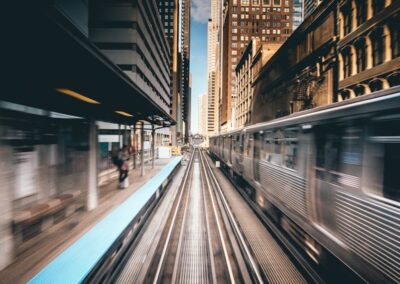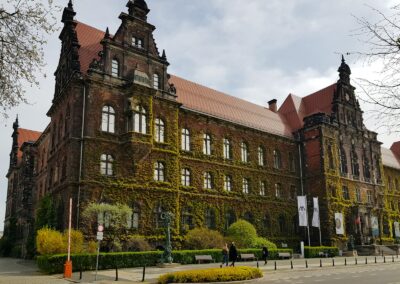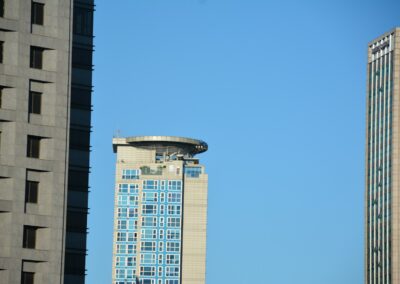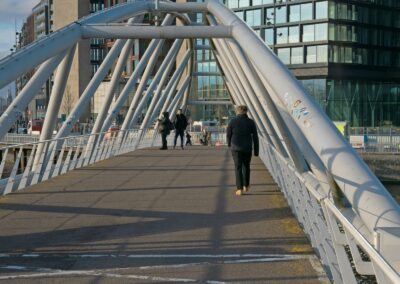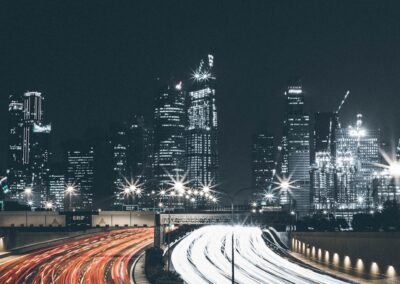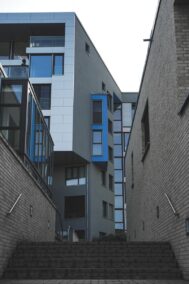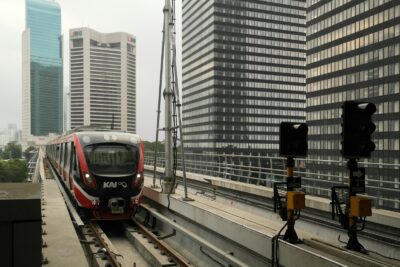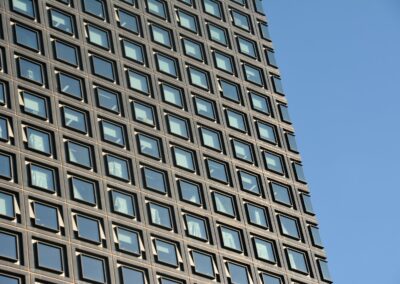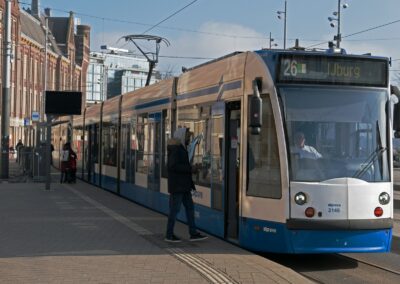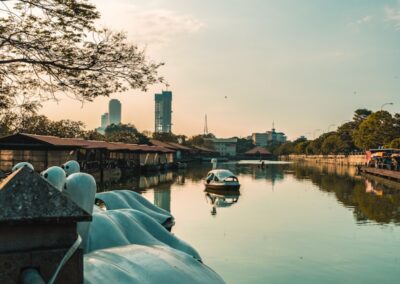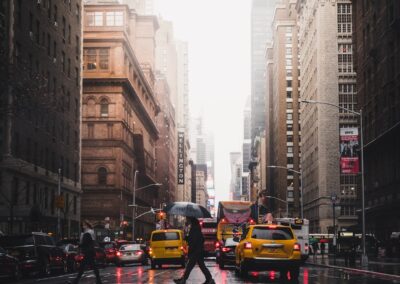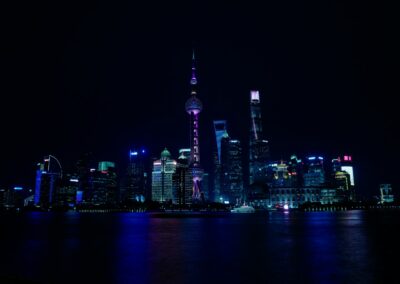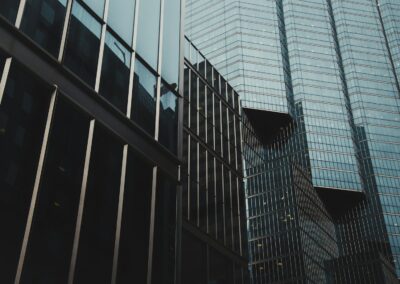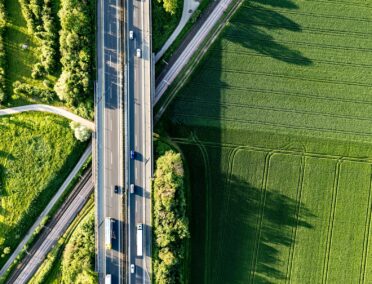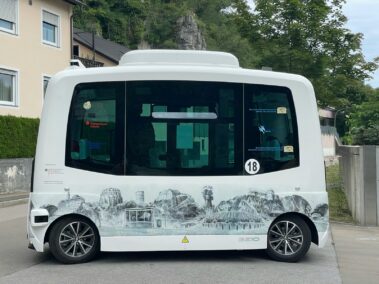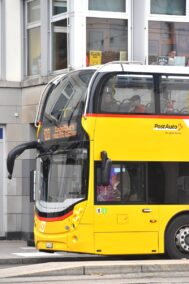Addressing Transportation Challenges in Densely Populated Skyscraper Cities
The Rise of Skyscraper Cities in Saudi Arabia and the UAE
The emergence of skyscraper cities presents unique transportation challenges that require innovative solutions. In rapidly developing regions like Saudi Arabia and the UAE, cities such as Riyadh and Dubai are at the forefront of urban growth, characterized by towering structures and dense populations. These urban centers are embracing modern technologies to enhance mobility and address the complexities associated with high-density living.
Riyadh’s skyline is transforming with ambitious projects such as the King Abdullah Financial District, which promises to be a hub for business and finance. To accommodate the increased population and traffic, Riyadh is investing in a comprehensive public transportation network. The Riyadh Metro, set to be one of the largest urban rail projects in the world, is designed to reduce congestion and provide efficient mobility solutions. This metro system, integrated with bus networks and smart traffic management systems, exemplifies how skyscraper cities can tackle transportation challenges through extensive infrastructure planning.
Dubai, known for its iconic skyline and futuristic architecture, is similarly addressing its transportation needs with advanced technologies. The city’s Roads and Transport Authority (RTA) has implemented initiatives such as the Dubai Metro, autonomous vehicles, and smart traffic management systems to enhance urban mobility. Dubai’s commitment to innovation is evident in projects like the Hyperloop, which aims to revolutionize long-distance travel with high-speed transportation. These efforts highlight Dubai’s proactive approach to solving transportation challenges in a densely populated urban environment.
Integrating AI and Smart Technologies in Urban Mobility
Artificial Intelligence (AI) and smart technologies are playing a crucial role in optimizing transportation in skyscraper cities. In both Riyadh and Dubai, AI-driven solutions are being deployed to manage traffic, enhance public transportation, and improve overall mobility. These technologies provide real-time data analysis, predictive modeling, and automation, which are essential for efficient transportation management in high-density areas.
In Riyadh, smart traffic management systems use AI to monitor and control traffic flow, reducing congestion and improving travel times. These systems analyze data from various sources, including traffic cameras, sensors, and GPS devices, to make real-time adjustments to traffic signals and provide route recommendations. By leveraging AI, Riyadh is creating a more responsive and adaptive transportation network that can meet the demands of its growing population.
Dubai is also harnessing the power of AI to enhance its transportation infrastructure. The RTA’s smart mobility initiatives include the deployment of autonomous vehicles, AI-powered traffic management, and predictive maintenance for public transport. These technologies not only improve efficiency but also contribute to sustainability by reducing emissions and energy consumption. Dubai’s vision of becoming a smart city is closely tied to its ability to integrate advanced technologies into its transportation systems, ensuring seamless and efficient mobility for residents and visitors alike.
The Role of Public-Private Partnerships in Urban Mobility
Public-private partnerships (PPPs) are essential for addressing transportation challenges in skyscraper cities. By collaborating with private sector companies, governments can leverage expertise, technology, and investment to develop and maintain advanced transportation systems. In both Saudi Arabia and the UAE, PPPs are driving innovation and efficiency in urban mobility projects.
Riyadh’s public transportation initiatives, including the Riyadh Metro, are being developed through partnerships with international companies specializing in infrastructure and transportation. These collaborations bring advanced technologies and best practices to the city’s transportation network, ensuring that projects are delivered on time and within budget. The involvement of the private sector also facilitates access to cutting-edge solutions and innovations that enhance the overall effectiveness of the transportation system.
In Dubai, the success of transportation projects such as the Dubai Metro and the Hyperloop can be attributed to strong public-private partnerships. The RTA works closely with technology companies, engineering firms, and financial institutions to implement and manage these projects. This collaborative approach allows Dubai to benefit from the latest advancements in transportation technology and infrastructure, ensuring that the city’s mobility solutions are among the most advanced in the world. By fostering partnerships, Dubai is able to continuously improve its transportation systems and address the challenges posed by its rapid urban growth.
Innovative Solutions for Sustainable Urban Mobility
Promoting Public Transportation and Reducing Car Dependency
One of the key strategies for addressing transportation challenges in skyscraper cities is promoting the use of public transportation and reducing dependency on private vehicles. In Riyadh and Dubai, efforts are underway to make public transport more attractive and accessible to residents, thereby alleviating congestion and improving air quality.
Riyadh’s public transportation system, including the metro and extensive bus networks, is designed to provide convenient and efficient alternatives to car travel. By offering reliable and affordable public transport options, the city aims to reduce the number of private vehicles on the road, easing traffic congestion and lowering emissions. Additionally, initiatives such as park-and-ride facilities and integrated ticketing systems make it easier for commuters to transition from private to public transport.
Dubai is also focusing on enhancing its public transportation infrastructure to reduce car dependency. The Dubai Metro, trams, and buses are complemented by initiatives such as water taxis and bike-sharing programs, providing a comprehensive and multimodal transport network. The city’s efforts to integrate various modes of transport encourage residents to use public transportation for their daily commutes, contributing to a more sustainable and efficient urban mobility system.
Implementing Sustainable and Eco-Friendly Transportation Solutions
Sustainability is a critical consideration in the development of transportation systems in skyscraper cities. Both Riyadh and Dubai are implementing eco-friendly solutions to reduce the environmental impact of urban mobility. These initiatives include the adoption of electric vehicles (EVs), the development of green public transport options, and the promotion of active transportation modes such as walking and cycling.
In Riyadh, the government is encouraging the use of electric vehicles by providing incentives for EV purchases and investing in charging infrastructure. The city’s public transportation network is also being expanded with eco-friendly buses and metro trains that use renewable energy sources. These efforts are part of Riyadh’s broader strategy to create a sustainable urban environment that prioritizes green mobility solutions.
Dubai is equally committed to sustainability in transportation. The RTA’s Green Economy initiative includes the introduction of electric and hybrid vehicles into the public transport fleet, the expansion of charging stations, and the promotion of cycling and walking. By investing in sustainable transportation solutions, Dubai is reducing its carbon footprint and creating a healthier, more livable urban environment. These initiatives align with the UAE’s Vision 2021, which aims to make the country one of the world’s most sustainable nations.
Fostering Innovation through Research and Development
Innovation is essential for addressing the transportation challenges of skyscraper cities. In both Saudi Arabia and the UAE, research and development (R&D) efforts are driving the creation of advanced mobility solutions. By fostering a culture of innovation, these countries are ensuring that their transportation systems remain at the cutting edge of technology and efficiency.
Riyadh is investing in R&D through institutions such as the King Abdullah University of Science and Technology (KAUST), which is conducting research on smart transportation, AI, and urban planning. These efforts are aimed at developing innovative solutions that address the unique challenges of high-density urban environments. By leveraging the expertise of researchers and technologists, Riyadh is positioning itself as a leader in urban mobility innovation.
Dubai is also a hub for transportation innovation, with initiatives such as the Dubai Future Accelerators program, which connects government entities with cutting-edge startups. This program fosters collaboration between public and private sectors to develop innovative mobility solutions. Additionally, the Dubai Autonomous Transportation Strategy aims to make 25% of all transportation in Dubai autonomous by 2030, highlighting the city’s commitment to embracing futuristic technologies.
Conclusion
The consequences of living in a simulated reality are vast and complex, touching on ethical, philosophical, and social dimensions. In regions like Saudi Arabia and the UAE, where technological innovation is rapidly advancing, it is essential to address these implications through robust ethical and philosophical frameworks. By developing comprehensive regulations, promoting public awareness, and fostering interdisciplinary collaboration, Riyadh and Dubai are leading the way in ensuring that the benefits of simulated realities are realized responsibly and equitably. These efforts demonstrate a commitment to harnessing the transformative power of technology while safeguarding fundamental human values.
#SkyscraperCities #UrbanMobility #TransportationSolutions #AIinTransportation #SmartCities #SaudiArabiaUrbanDevelopment #UAEInfrastructure #RiyadhSkyscrapers #DubaiInnovation


